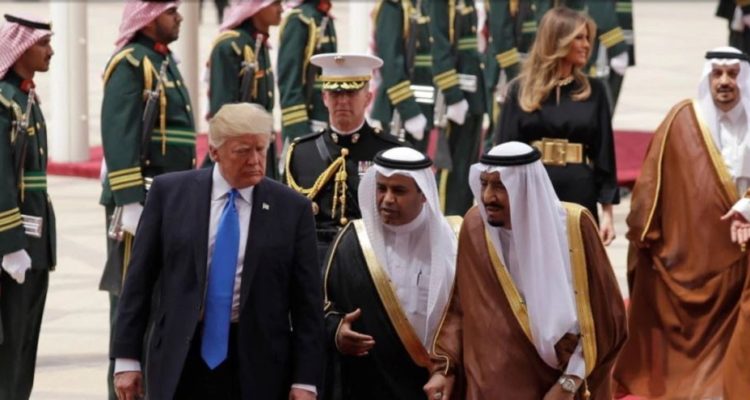Trump called on Middle Eastern leaders to combat a “crisis of Islamic extremism” emanating from the region, casting the fight against terrorism as a “battle between good and evil,” not a clash between the West and Islam.
US President Donald Trump’s address Sunday was the centerpiece of his two-day visit to Saudi Arabia, his first stop overseas as president. During a meeting of more than 50 Arab and Muslim leaders, he sought to chart a new course for America’s role in the region, one aimed squarely on rooting out terrorism, with less focus on promoting human rights and democratic reforms.
“We are not here to lecture — we are not here to tell other people how to live, what to do, who to be, or how to worship,” Trump said, speaking in an ornate, multi-chandeliered room. “Instead, we are here to offer partnership — based on shared interests and values — to pursue a better future for us all.”
Even as the president pledged to work alongside Middle Eastern nations, he put the onus for combating terrorism on the region. Bellowing into the microphone, he implored Muslim leaders to aggressively fight extremists: “Drive them out of your places of worship. Drive them out of your communities.”
The president has been enthusiastically embraced in Riyadh, where the ruling royal family has welcomed his tougher stance on Iran, its regional foe.
Trump slammed Iran for spreading “destruction and chaos” throughout the region. His comments were echoed by Saudi King Salman, who declared, “The Iranian regime has been the spearhead of global terrorism.”
He condemned “Islamists” and “Islamic terror of all kinds,” but never specifically referred to radical Islam. Indeed, his address was full of praise for Muslim world’s history and culture. He declared Islam “one of the world’s great faiths.”
Counterweight to Obama’s debut speech in Cairo
White House officials said they considered Trump’s address to be a counterweight to President Barack Obama’s debut speech to the Muslim world in 2009 in Cairo.
Obama had called for understanding and referred to what he considered America’s missteps in the region. That speech was denounced by many Republicans and criticized by a number of the United States’ Middle East allies as being a sort of apology.
Trump’s speech came amid a renewed courtship of the United States’ Arab allies. Trump held individual meetings with leaders of several nations, including Egypt and Qatar, before participating in a round-table with the Gulf Cooperation Council and joining Saudi King Salman in opening Riyadh’s new anti-terrorism center.
A Sunday meeting with Egyptian President Abdel-Fattah el-Sissi underscored the kinship, with Trump saluting his counterpart on the April release of Egyptian-American charity worker Aya Hijazi, who had been detained in the country for nearly three years.
El-Sissi invited Trump to visit him in Egypt, adding, “You are a unique personality that is capable of doing the impossible.” As the participants laughed, Trump responded: “I agree.”
The president then complimented el-Sissi’s choice of footwear, telling his Egyptian counterpart “Love your shoes. Boy, those shoes” after their brief remarks to the press.
On Saturday, the US and Saudi Arabia signed a weapons deal worth nearly $110 billion, among other agreements, including in the private sector.
Trump is scheduled to land Monday in Israel for a two-day visit that also includes a meeting in Bethlehem with Palestinian Authority Chairman Mahmoud Abbas. He will then fly to Italy to meet with Pope Francis and Italian President Mattarella, followed by a NATO summit in Brussels and back to Italy for a G7 meeting in Sicily.
By: AP and World Israel News Staff





